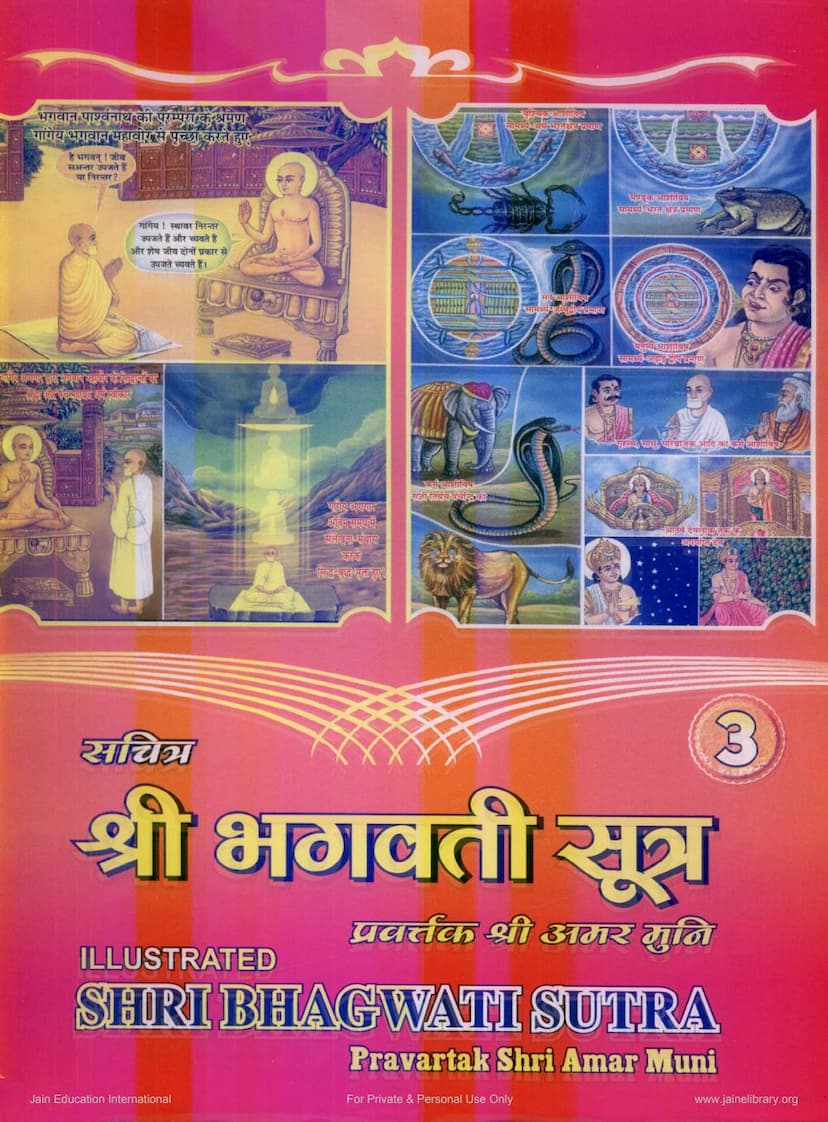Agam 05 Ang 05 Bhagvati Vyakhyaprajnapti Sutra Part 03 Sthanakvasi
Added to library: September 1, 2025

Summary
Summary of Agam 05 Ang 05 Bhagvati Vyakhyaprajnapti Sutra Part 03
This document is the third part of the Bhagavati Sutra (also known as Vyakhya Prajnapti), a foundational text in Jain Agamas. It is an extensive and significant work that provides detailed explanations of Jain philosophy, cosmology, and ethics. This particular volume, compiled by Pravartak Shri Amar Muni and Shreechand Surana, focuses on specific sections of the Bhagavati Sutra, covering the eighth, ninth, and tenth chapters.
Key Themes and Contents:
The volume delves into a wide array of complex and profound topics, illustrating the depth and breadth of Jain teachings. Some of the prominent themes explored include:
- The Nature of Beings and Their Activities: The text categorizes and discusses the nature of various beings based on their state of existence (gati, indriya, kaaya, sukshma-baadar, paryapt-aparyapt, bhavasth, bhavasiddhik, sanjni, labdhi, upayoga, yoga, leshya, kashaya, veda, aahaarak). It meticulously details whether these beings are endowed with knowledge (jnani) or wrong knowledge/ignorance (ajnani) and the types of knowledge (mati, shruta, avadhi, manahparyava, keval) and ignorance (mati-ajnana, shruta-ajnana, vibhanga) they possess.
- The Celestial Realm: Detailed discussions are provided on the various celestial realms, including the number and types of suns and moons, their movements, and the nature of stellar gods and their genesis.
- Theories of Bondage: The text elaborates on the concept of karmic bondage (bandh), differentiating between bondage acquired through action (prayoga bandh) and natural bondage (visrasa bandh). It further breaks down these categories into various types, explaining their causes and durations.
- Activities and Their Karmic Implications: The text analyzes various activities (kriyas) of beings, categorizing them into five types and explaining their connection to karmic implications.
- Spiritual Endeavor and Liberation: The importance of right knowledge, perception, and conduct (Jnana, Darshan, Chaaritra) as pathways to liberation is highlighted. The text also discusses the concept of steadfastness (araadhana) in spiritual practice even in the face of adversities.
- The Nature of Knowledge and Ignorance: A significant portion of the text is dedicated to exploring the different types of knowledge (jnana) and ignorance (ajnana), their scope, and the subtle distinctions between them.
- The Concept of Ashrutva Kevali: This section discusses the unique concept of self-enlightened omniscients, beings who attain omniscience without direct auditory learning from other omniscients, highlighting their nature and their capacity for spiritual realization.
- The Gangeya Dialogue: A narrative illustrating the path to spiritual liberation through proper understanding and the Guru's guidance is presented through the story of Gangeya, a disciple who attained omniscience through the teachings of Bhagavan Mahavir.
- The Nature of Soul and Matter: The text explores the relationship between the soul (jiva) and matter (pudgal), explaining how the soul, while distinct, can be considered both a possessor of matter and, in a specific context, as matter itself.
- The Cycle of Birth and Death: Discussions on the continuous and interrupted birth and death processes (upapaat and chyavan) of various categories of beings, from infernal beings to celestial beings, are presented.
- The Concept of Praveshanak: The text categorizes the entrance of beings into different realms of existence (infernal, animal, human, and divine) and elaborates on the various permutations and combinations of these entrances.
Editorial Approach:
The book is presented with the original Ardhamagadhi text, accompanied by Hindi and English translations and detailed elaborations. The inclusion of multicolored illustrations aims to make the complex philosophical and cosmological concepts more accessible to a wider audience. The editorial effort is recognized as a significant contribution to Jain literature, making these ancient scriptures available in a modern, comprehensible format.
Overall Significance:
The Bhagavati Sutra, and this volume in particular, serves as a comprehensive guide to understanding the fundamental principles of Jainism. It highlights the interconnectedness of actions, karma, and spiritual progress, offering profound insights into the Jain worldview and the path to liberation. The meticulous commentary and illustrations provided by the editors and publisher aim to illuminate these complex doctrines for contemporary readers and scholars.